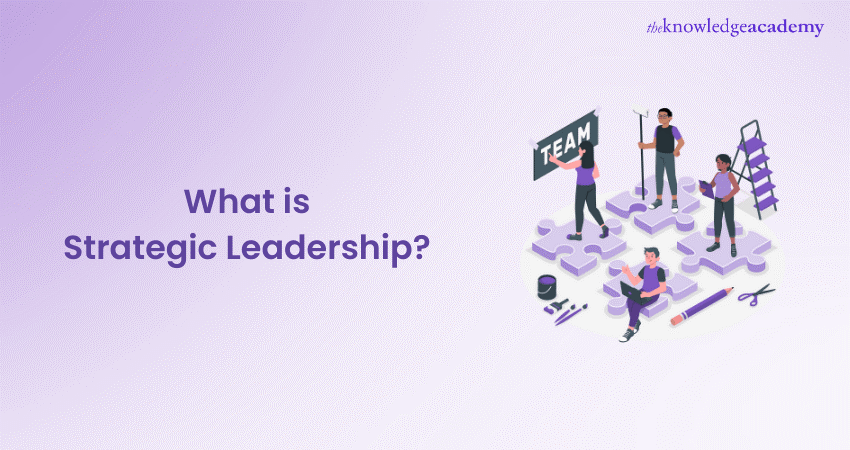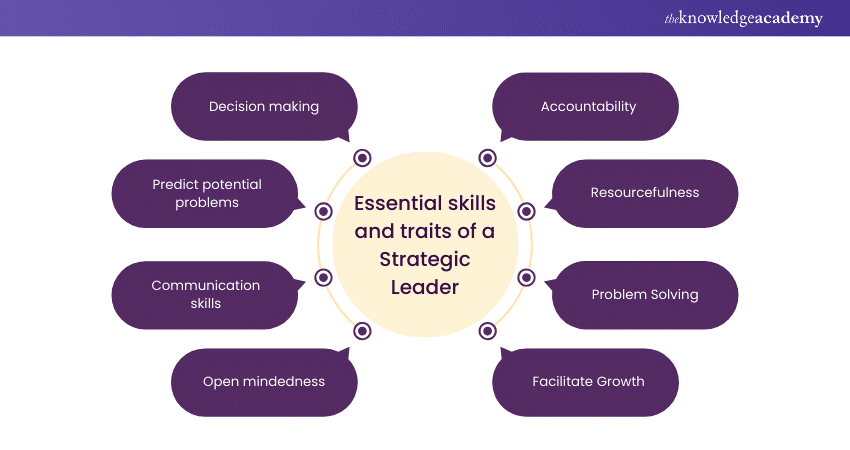We may not have the course you’re looking for. If you enquire or give us a call on +1 6474932992 and speak to our training experts, we may still be able to help with your training requirements.
Training Outcomes Within Your Budget!
We ensure quality, budget-alignment, and timely delivery by our expert instructors.

Strategic Leadership is a style of leadership that empowers you to plan and execute strategies that enable your team to achieve a common goal. It involves focusing on the bigger picture rather than just small day-to-day tasks.
As a strategic leader, it is essential to understand your team's strengths and how to use them effectively. You will also be expected to plan and guide your team through processes while understanding what motivates them. Additionally, you must make choices that are in the best interests of your team.
If you think you have what it takes to be a great strategic leader, this blog is for you. Read on to gain insights into the skills and strategies needed to become an effective Strategic Leader.
Table of Contents
1) What is Strategic Leadership?
2) Essential skills and traits of a Strategic Leader
3) Strategies for Strategic Leadership
4) Types of Strategic Leadership
5) Conclusion
What is Strategic Leadership?
Strategic Leadership involves creating an environment that enables your team to maximise productivity. As a Strategic Leader, it is important to consider your team's strengths when allocating responsibilities, allowing them to reach their potential.
You must be open to new ideas and strategies to allocate resources and evolve with your team effectively. It is important to always keep the big picture in mind for your team as a whole rather than just immediate outcomes.
As a good Strategic Leader, you should allow room for failure, as it is an important learning experience for your team. Allowing your team to learn from their mistakes is crucial in focusing on the big picture.
Lead your team to Excellence, sign up for our Leadership Courses!
Essential skills and traits of a Strategic Leader
To be a good Strategic Leader, you need to build a skillset that allows you to lead a team effectively. Here are some of the top skills and traits you must possess to be an excellent strategic leader:

Decision making
As a strategic leader, you are responsible for making decisions for your team. The success of the team's performance may depend on the decisions you make as their leader. Making the right decisions is crucial to ensure your team performs at its best and maintains high morale.
Predict potential problems
As a strategic leader, being able to anticipate potential problems can greatly benefit you. By taking into account the team's weaknesses and past patterns, you can devise ways to prevent or prepare for any possible issues that may occur.
Communication skills
Good communication skills are crucial for better interactions with your team and upper management. It enables you to effectively convey your team's requirements to management when required. Additionally, strong communication skills help you keep your team engaged and interested, leading to smooth task delegation and completion.
Open mindedness
Every workplace is susceptible to inconsistencies and errors. As a good strategic leader, it is essential to allow flexibility to your team. Moreover, being open-minded to your team's suggestions and ideas is a crucial characteristic of an effective strategic leader.
Practice Mindfulness with our Growth Mindset Training!
Accountability
A good strategic leader demonstrates accountability towards their team and supports them when needed. This behaviour shows the team that their leader is looking out for them, which helps in boosting team morale. Furthermore, it sets an excellent example for the team when their leader shows accountability, even when there are potential consequences.
Resourcefulness
As a strategic leader, you must provide your team with the necessary resources that allow them to perform at their best. Moreover, it is equally essential for you to manage these resources effectively in order to maximise your team's potential, even when resources are limited.
Problem solving
It is important to remember that some of the tasks you assign to your team may not go as planned. In such a situation, it is crucial to improvise and find solutions to any problems that arise. As a strategic leader, you should showcase your problem-solving abilities and inspire your team to do the same.
Facilitate growth
As mentioned previously, Strategic Leaders focus on the bigger picture, which involves promoting growth to empower the team. It is also crucial to establish an environment that fosters growth for the team and equips them with the necessary skills to perform better in the workplace.
Strategies for Strategic Leadership
To be a Strategic Leader, you must adopt a set of strategies that benefit your leadership style and, in turn, your team. Here are some strategies that you can adopt to make yourself a good Strategic Leader:
Delegate
Distributing responsibilities in a way that empowers employees to grow in their respective domains while effectively managing their responsibilities is highly recommended. Granting autonomy to your team members, expressing confidence in their abilities, and encouraging problem-solving skills can help achieve this. Delegating responsibilities to capable team members also creates an opportunity to complete more tasks efficiently.
Learn to effectively delegate responsibilities by signing up with our Delegation Training Course!
Welcome openness
Openness is a crucial aspect of Strategic Leadership. As the leader, creating a welcoming environment that encourages team members to share any problems they encounter is essential. You should also maintain open communication with your team regarding any workplace issues or attitudes, promoting transparency within the team.
Promote channels of innovation and communication
When the team members come forth with innovative ideas to tackle issues at hand, you should be able to facilitate them. It will help if you are flexible with your communicative methods and can establish efficient communication channels.
Use failures as learning tools
Encountering failures as a team can often be disheartening. As a strategic leader, it is up to you to build morale and get the team back on its feet. Using failures as a tool for learning can be an effective strategy for you to do so.
Promote cooperation among departments
As a Strategic Leader, facilitating harmony between departments is important. Promoting cooperation among departments allows your teams to work efficiently without miscommunication and hesitation.
Provide opportunities for experiential learning
As a leader, supporting your team to enhance their performance is important. Offering opportunities for the team to learn from their experiences is a great strategy.
Management of resources
Resources in a workplace may often be limited, so utilising them to your team's maximum potential is essential. As a Strategic Leader, it is up to you to allocate these resources mindfully to attain the best possible outcomes.
Types of Strategic Leadership
There are four distinct types of Strategic Leadership that can help you understand which one fits best for you and your team. These four types are:
Transactional leader
This refers to the relationship between managers and employees. It involves ensuring that employees understand their roles and responsibilities, measuring their performance, and encouraging them to improve.
Transformational leadership
This leadership style aims to lead by example and inspires employees to be better versions of themselves. In this style, you, as the leader, will need to model the attributes you wish to see in your team.
Visionary leadership
Like transformational leadership, this style involves a vision you must set for the team. The vision needs to be such that it motivates the team to work towards it.
Collaborative leadership
This style avoids the lead acting as a superior; instead, it involves you with the team as a member working with them. It's a cross functional collaborative style that establishes a relationship between the lead and the team.
Conclusion
Strategic Leaders can lead a team towards a common goal by effectively managing their resources and workforce. They prioritise the overall objective rather than just the immediate tasks. As Leaders, they offer ample opportunities for their team members to develop their skills and excel in the job market. They use failures as a means of learning and set an example for their team by being accountable and transparent.
Frequently Asked Questions

Strategic Leadership is a form of leadership in which the Manager establishes an environment for the team to maximise productivity. A Strategic Leader considers his team's strengths while allocating responsibilities, enabling the team to reach their potential.

The four types of Strategic Leadership are as follows:
a) Transactional leader: A Strategic Leader who helps the employees understand their roles and responsibilities, measures their performance and encourages them to improve when necessary.
b) Transformational leadership: A Strategic Leader that leads by example. Modelling the skill and attitude that are expected from the team.
c) Visionary leadership: Sets a vision for the team that motivates them to work towards it.
d) Collaborative leadership: A strategic leader who actively works alongside their team to build morale and promote unity.

The Knowledge Academy takes global learning to new heights, offering over 30,000 online courses across 490+ locations in 220 countries. This expansive reach ensures accessibility and convenience for learners worldwide.
Alongside our diverse Online Course Catalogue, encompassing 17 major categories, we go the extra mile by providing a plethora of free educational Online Resources like News updates, Blogs, videos, webinars, and interview questions. Tailoring learning experiences further, professionals can maximise value with customisable Course Bundles of TKA.

The Knowledge Academy’s Knowledge Pass, a prepaid voucher, adds another layer of flexibility, allowing course bookings over a 12-month period. Join us on a journey where education knows no bounds.

The Knowledge Academy offers various Leadership Courses, including Skill Training, Introduction to Supervising a Team, Successful People Managment, Business Model Training and Agile. These courses cater to different skill levels, providing comprehensive insights into Business Skills methodologies.
Our Business Skills blogs cover a range of topics related to Stategic Leadership, offering valuable resources, best practices, and industry insights. Whether you are a beginner or looking to advance your Project Management skills, The Knowledge Academy's diverse courses and informative blogs have you covered.
Upcoming Business Skills Resources Batches & Dates
Date
 Leadership Skills Training
Leadership Skills Training
Fri 13th Dec 2024
Fri 10th Jan 2025
Fri 14th Feb 2025
Fri 11th Apr 2025
Fri 23rd May 2025
Fri 8th Aug 2025
Fri 26th Sep 2025
Fri 21st Nov 2025
 Halloween sale! Upto 40% off - 95 Vouchers Left
Halloween sale! Upto 40% off - 95 Vouchers Left







 Top Rated Course
Top Rated Course



 If you wish to make any changes to your course, please
If you wish to make any changes to your course, please


